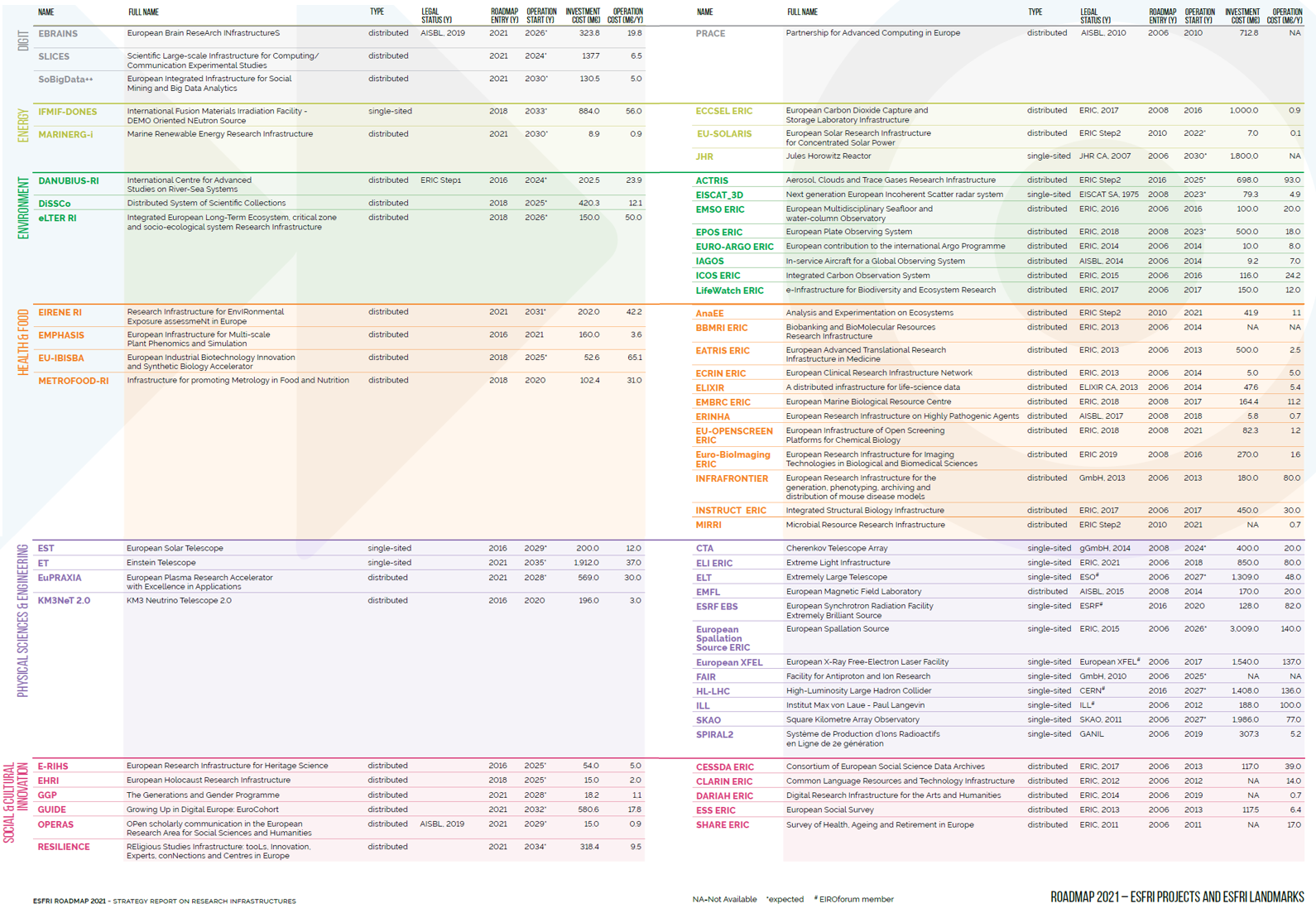European Strategy Forum on Research Infrastructures - ESFRI
The ESFRI Roadmap lists the European research infrastructures to be jointly set up as well as projects of ESFRI already in the implementation phase (referred to as ESFRI Landmarks). It is updated approximately every two years in an iterative process. It covers areas of social sciences and humanities, the materials and physical sciences, the energy and engineering field as well as environmental, Earth and life sciences. These projects are very diverse in size and character. The European Commission hosts the ESFRI Secretariat and a Commission representative is a member of the Forum. ESFRI developed a sustainable legal entity to establish European research infrastructures, the so-called "European Research Infrastructure Consortia (ERIC)".
For the full, please always check the most updated sources on the ESFRI website.
In the 2021 version of the roadmap, the list included 22 ESFRI Projects and 41 ESFRI Landmarks:
source: https://roadmap2021.esfri.eu/media/1250/rm21-part-1.pdf
Examples with participation from the Western Balkans are:
ESFRI Projects
- EMPHASIS European Infrastructure for Multi-scale Plant Phenomics and Simulation
www.emphasis.plant-phenotyping.eu
with participation from Serbia - METROFOOD-RI Infrastructure for promoting Metrology in Food and Nutrition
www.metrofood.eu
with participation from North Macedonia - RESILIENCE REligious Studies Infrastructure: tooLs, Innovation, Experts, conNections and Centres in Europe
www.resilience-ri.eu
with participation from Albania and Bosnia Herzegovina
ESFRI Landmarks
- HL-LHC High-Luminosity Large Hadron Collider
https://hilumilhc.web.cern.ch/
with participation from Serbia - CESSDA ERIC Consortium of European Social Science Data Archives
www.cessda.eu
with participation from North Macedonia and Serbia - DARIAH ERIC Digital Research Infrastructure for the Arts and Humanities
www.dariah.eu
with participation from Bosnia Herzegovina and Serbia
Projects added in 2021 are:
- EBRAINS - European Brain ReseArch INfrastructureS, a distributed digital infrastructure at the interface of neuroscience, computing and technology, offering scientists and developers advanced tools and services for brain research.
- EIRENE RI - Research Infrastructure for EnvIRonmental Exposure assessment in Europe, the first EU infrastructure on human exposome (environmental determinants of health).
- ET - Einstein Telescope, the first and most advanced third-generation gravitational-wave observatory, with unprecedented sensitivity that will put Europe at the forefront of the Gravitation Waves research.
- EuPRAXIA - European Plasma Research Accelerator with Excellence in Applications, a distributed, compact and innovative accelerator facility based on plasma technology, set to construct an electron-beam-driven plasma accelerator in the metropolitan area of Rome, followed by a laser-driven plasma accelerator in European territory.
- GGP - The Generations and Gender Programme, aiming to provide high quality and cross-nationally comparable longitudinal data to answer pressing scientific and societal challenges on population and family dynamics.
- GUIDE - Growing Up in Digital Europe-EuroCohort, Europe’s first comparative birth cohort survey, aiming to support the development of social policies for the enhancement of the wellbeing of children, young people and their families across Europe.
- MARINERG-i - Offshore Renewable Energy Research Infrastructure, setting out to become the leading internationally Distributed Research Infrastructure in the Offshore Renewable Energy (ORE) sector, with a network of test facilities spread across Europe.
- OPERAS - Open Access in the European Research Area through Scholarly Communication, the distributed RI to enable Open Science and upgrade scholarly communication practices in the Social Sciences and Humanities (SSH) in line with the European Open Science Cloud.
- RESILIENCE - Religious Studies Infrastructure: Tools, Innovation, Experts, Connections and Centers, a unique, interdisciplinary scientific RI for all Religious Studies, building a high-performance platform, supplying tools and access to physical and digital data to scholars from all scientific disciplines.
- SLICES - Scientific Large-scale Infrastructure for Computing/Communication Experimental Studies ambitions to become an impactful RI in Digital Sciences, including concerns regarding energy consumption and the implementation of the Green Deal.
- SoBigData++ RI - European Integrated Infrastructure for Social Mining and Big Data Analytics, a resource for sharing datasets, methods, research skills and computational resources for supporting the comprehension of social phenomena through the lens of Big Data.

